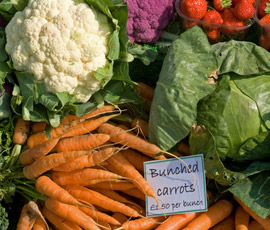Organic farming may ‘do more environmental harm than good’

Encouraging Europe’s farmers to switch to organic production could cause more damage to the global environment that if they stuck to conventional farming systems, a leading scientist has said.
Tim Benton, the UK’s global food security champion, said organic farms usually helped improve biodiversity and delivered other environmental goods locally and nationally.
But he said reduced yields in organic systems meant that land elsewhere had to be cultivated to make up the food shortfall, often at a greater environmental cost.
“If the European Union increased organic farming to 20% of our land area, our production would go down, but our demand for food wouldn’t,” he said during a Farming Futures and AHDB conference on sustainable agriculture on Wednesday (16 January).
“We would need about 10m extra hectares to produce the same level of food, which would mean importing more from other countries.
“This would be from areas like sub-Saharan Africa, where environmental costs would be higher and regulation is less.
“By encouraging organic farming in Europe we are transporting and amplifying the global costs of food production.”
Professor Bennett said that simply encouraging Europe’s farmers to farm in a low-carbon or more sustainable way was not going to help feed the world’s growing population.
“If we reduce yields in one place, somewhere else is going to take the hit as our reduced yields send signals to the market to increase yields elsewhere,” he told delegates.
“By encouraging organic farming in Europe we are transporting and amplifying the global costs of food production.”
Tim Benton
“If yields are dropped to increase environmental benefits, that might not be sustainable because of the extra land and water needed to regain that yield.
“We can’t look at sustainability in one place.”
The arguments about how farmers should sustainably intensify production still needed to be solved, Prof Benton added, but he warned the industry not to look to technology for the answers.
“Sustainable intensification is a technology-neutral journey,” he said. “It is about producing more and impacting less. It needs landscape planning to allow non-cropped areas to provide things that are valuable to society.
“It’s not about more chemicals or tractors. It’s through using more labour and using using knowledge in a better way.”
Tom MacMillan, innovation director at the Soil Association, agreed addressing knowledge and labour use was an important way to improve productivity.
But he insisted organic farming could contribute to securing sustainable food supplies and in some cases yields could out-perform conventional practices.
A report by the Worldwatch Institute on 15 January said organic farming could improve nutrition intake and sustain livelihoods in rural areas while reducing vulnerability to climate change and enhancing biodiversity, Dr MacMillan said.
“[The report said] well-established organic production can outperform conventional practices – especially in times of drought,” he added.
“While organic yields can be 10-30% lower than high input farming in developed countries, organic approaches can increase yields by up to 100% compared to traditional agriculture in developing countries without the need for expensive inputs.”
Keep up with the latest arable news

